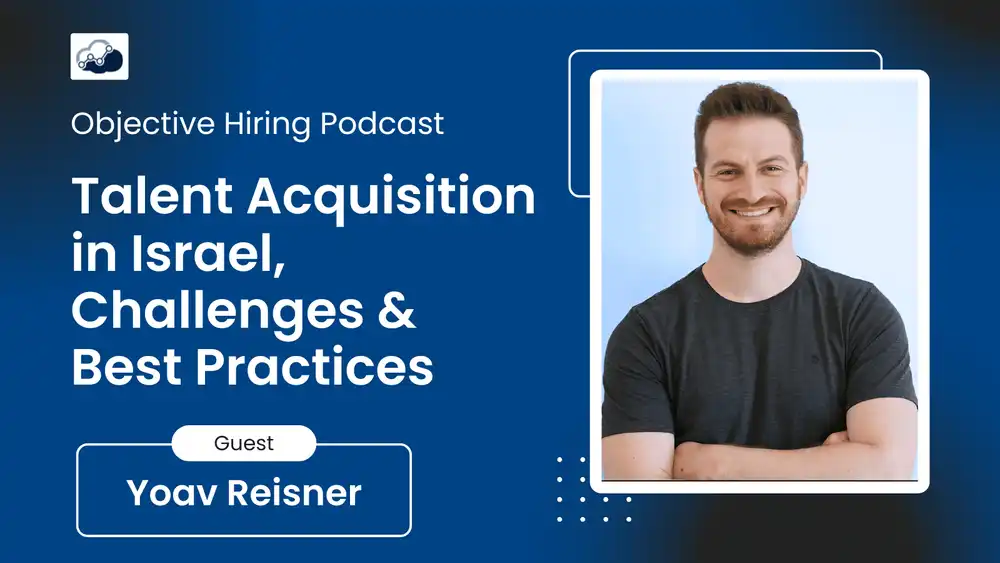Yoav Reisner on Hiring in Israel’s Tech Market: Stability, Military Experience, and Non-Traditional Talent

When hiring conditions change, hiring strategies have to change too. And nowhere is that more evident than in Israel’s tech scene.
In this episode of the Objective Hiring podcast, Tim Freestone, founder of Alooba, sits down with Yoav Reisner, Head of Data, to discuss hiring in a uniquely complex environment—Israel’s fast-moving, security-conscious, and often unpredictable tech industry.
“The war and layoffs really shifted things. Candidates are much more cautious—they want stability more than high salaries.” – Yoav Reisner
Let’s unpack three key themes from the episode: changing candidate priorities, evaluating military backgrounds, and why traditional CVs are becoming less relevant.
A Shift Toward Job Stability
With recent regional instability, war, and waves of tech layoffs, job seekers in Israel are increasingly prioritising job security over salary or perks.
“A year ago, it was all about salary. Now, they ask about runway and product-market fit. They want to know you’re not going to vanish in six months.” – Yoav Reisner
This shift means that companies need to market not just their mission or benefits—but their actual business fundamentals. Are you profitable? Are you backed by solid investors? Do you have stable leadership?
For hiring managers, transparency is now part of the employer value proposition. If you're not upfront about your financial outlook, top candidates may walk away before even starting the interview process.
The Military Experience Challenge
One of the standout points in Yoav’s hiring experience is the complexity of hiring military-trained talent.
“Some candidates are from elite units, but they can’t say what they did. It’s a total black box.” – Yoav Reisner
Hiring from the army means working with unclear CVs, jargon-heavy roles, and limited disclosure. Yoav explains that even terms like “Product Analyst” or “System Developer” in the military context often have little overlap with the private sector versions of those roles.
So how does he make it work?
By using skills-based evaluation and structured assessments, not resumes. He puts candidates through tailored, objective tasks that focus on core capabilities.
“I can’t rely on their story. I need to see them solve real problems. That’s the only way I can know what they can do.” – Yoav Reisner
It’s also where tools like Alooba’s skills assessments come in. When traditional proxies like job titles and university degrees break down, direct measurement becomes essential.
When the CV Stops Being Useful
Yoav doesn’t hold back on his opinion about CVs.
“A good-looking CV tells you they’re good at writing CVs. That’s it.” – Yoav Reisner
In high-variance markets—like Israel’s, where military and non-academic backgrounds are common—CVs often create more confusion than clarity. They mask true skill, favour polished communicators, and offer little predictive value.
Yoav’s solution is simple: treat the CV as just a starting point. The real insight comes from how a candidate solves problems.
“Even if someone’s done nothing on paper, they might fly through the assessment. I’ve seen it happen.” – Yoav Reisner
This approach makes the process fairer, especially for those from unconventional paths—like autodidacts, career switchers, or those without formal education.
What This Means for Hiring Managers
If you’re hiring in a market that’s volatile or full of non-traditional talent, the lessons from this episode are clear:
- Sell stability. Be ready to explain why your company is a safe bet.
- Don’t over-index on the resume. Use structured interviews and assessments instead.
- Recognise that not all great talent looks the same on paper.
Yoav’s system is a pragmatic response to a complex reality. He’s hiring smart, adaptable people in an environment that’s constantly shifting. And he’s doing it without a traditional TA team behind him.
“It’s a hiring market that forces you to adapt—or fail.” – Yoav Reisner
If your team is facing similar challenges, consider using structured processes and skills assessments. Platforms like Alooba make it easier to evaluate talent fairly and efficiently—even when the background is murky.